Unit 11 How was your school trip? Section A 2d-3c 课件(共29张PPT)
文档属性
| 名称 | Unit 11 How was your school trip? Section A 2d-3c 课件(共29张PPT) | 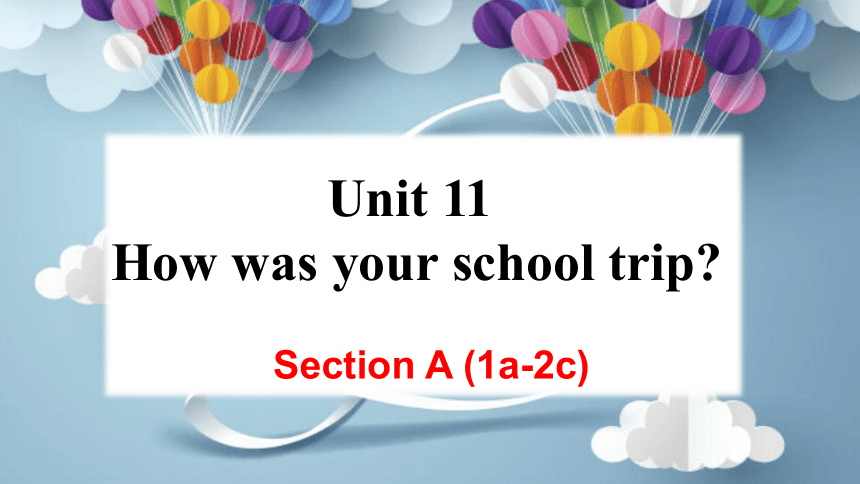 | |
| 格式 | pptx | ||
| 文件大小 | 1.9MB | ||
| 资源类型 | 教案 | ||
| 版本资源 | 人教新目标(Go for it)版 | ||
| 科目 | 英语 | ||
| 更新时间 | 2023-05-23 14:10:29 | ||
图片预览

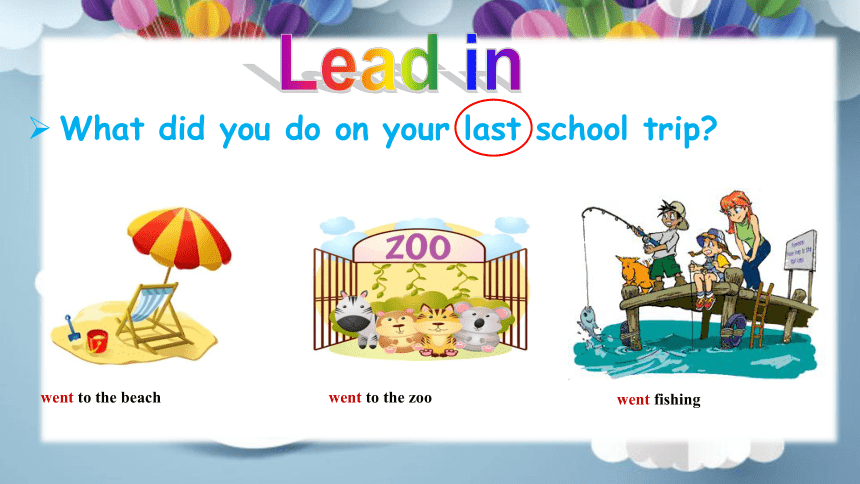
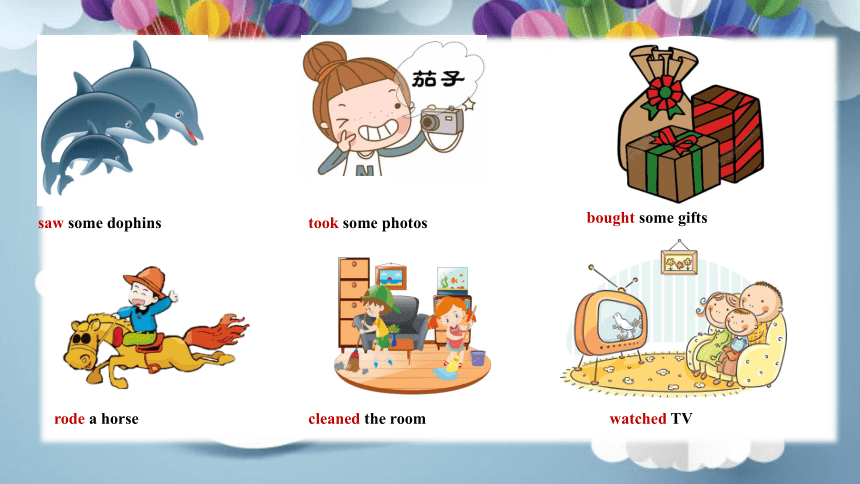
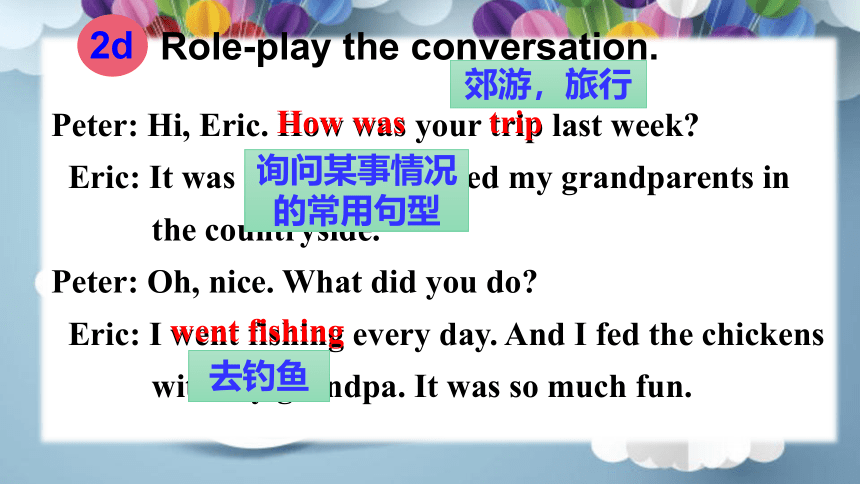
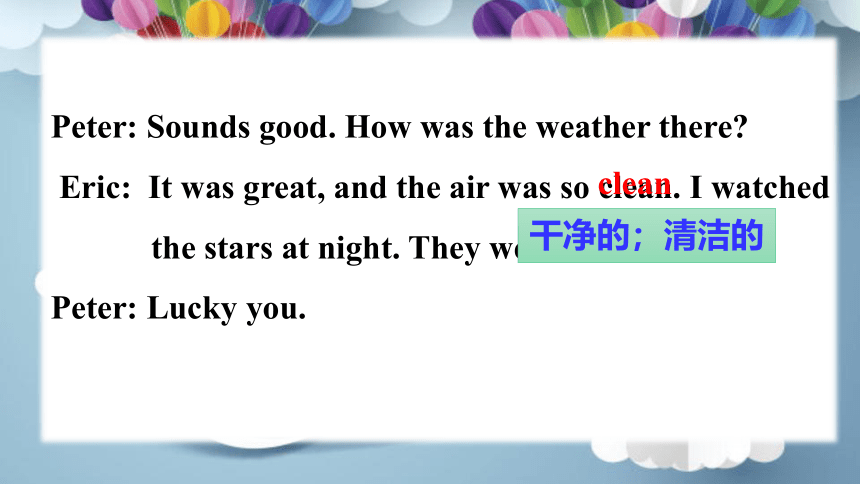
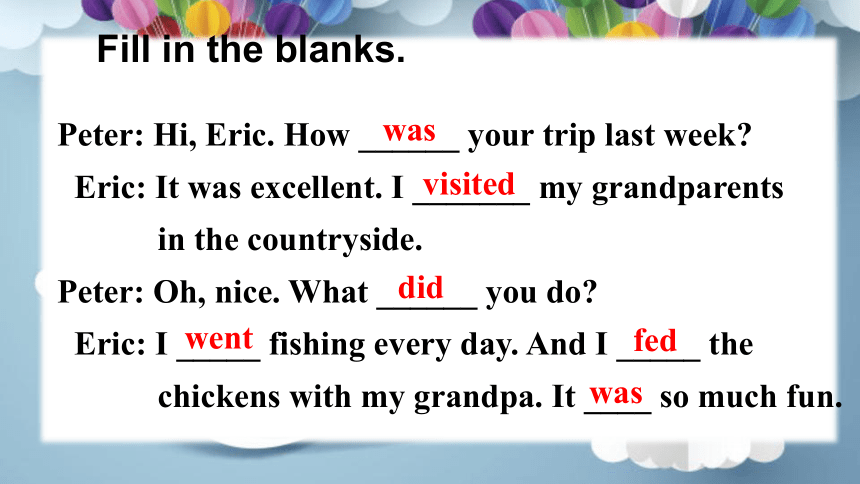
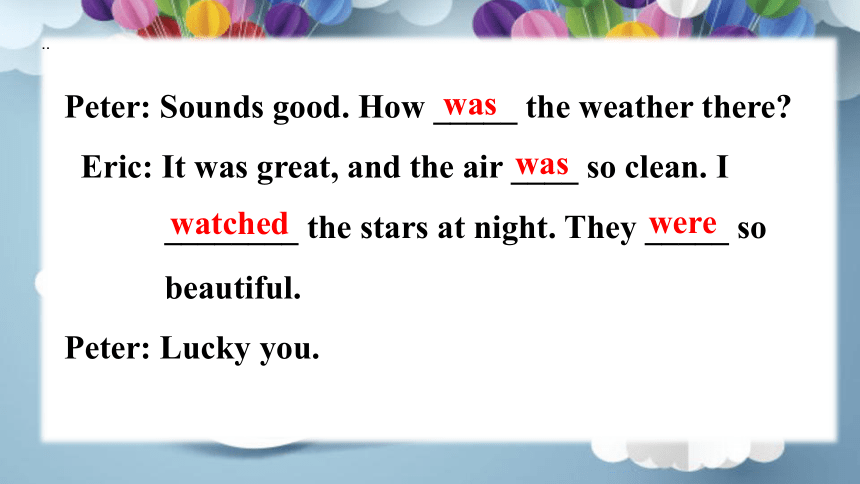
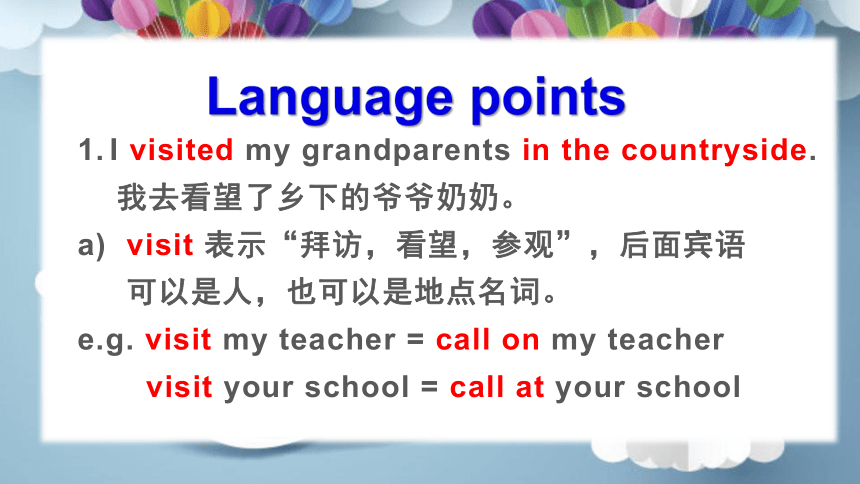
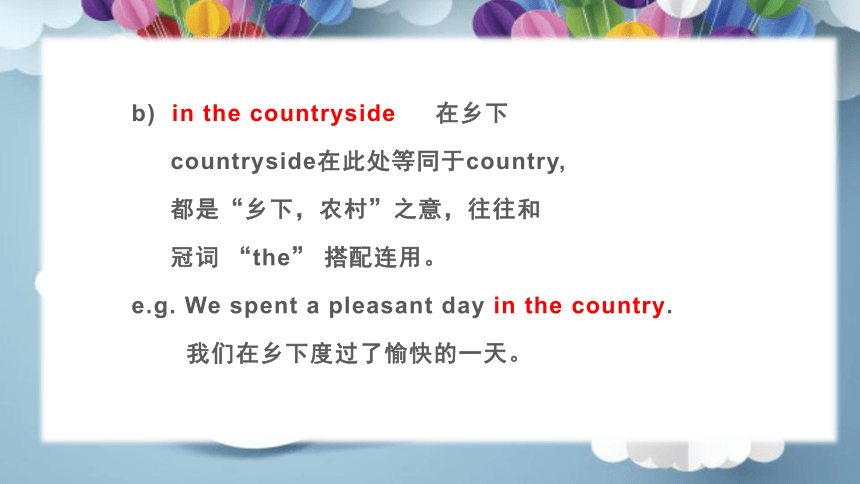
文档简介
(共29张PPT)
Section A (1a-2c)
Unit 11
How was your school trip
Lead in
What did you do on your last school trip
went to the zoo
went to the beach
went fishing
saw some dophins
took some photos
bought some gifts
rode a horse
cleaned the room
watched TV
Peter: Hi, Eric. How was your trip last week
Eric: It was excellent. I visited my grandparents in
the countryside.
Peter: Oh, nice. What did you do
Eric: I went fishing every day. And I fed the chickens
with my grandpa. It was so much fun.
Role-play the conversation.
How was
询问某事情况的常用句型
trip
郊游,旅行
went fishing
去钓鱼
2d
Peter: Sounds good. How was the weather there
Eric: It was great, and the air was so clean. I watched
the stars at night. They were so beautiful.
Peter: Lucky you.
clean
干净的;清洁的
Fill in the blanks.
Peter: Hi, Eric. How ______ your trip last week
Eric: It was excellent. I _______ my grandparents
in the countryside.
Peter: Oh, nice. What ______ you do
Eric: I _____ fishing every day. And I _____ the
chickens with my grandpa. It ____ so much fun.
was
visited
did
went
fed
was
..
Peter: Sounds good. How _____ the weather there
Eric: It was great, and the air ____ so clean. I
________ the stars at night. They _____ so
beautiful.
Peter: Lucky you.
was
was
watched
were
I visited my grandparents in the countryside.
我去看望了乡下的爷爷奶奶。
a) visit 表示“拜访,看望,参观”,后面宾语
可以是人,也可以是地点名词。
e.g. visit my teacher = call on my teacher
visit your school = call at your school
Language points
b) in the countryside 在乡下
countryside在此处等同于country,
都是“乡下,农村”之意,往往和
冠词 “the” 搭配连用。
e.g. We spent a pleasant day in the country.
我们在乡下度过了愉快的一天。
2. I fed the chickens with my grandpa.
我和祖父一起给鸡喂食。
“ feed … with …”词组表示“用……
喂……;和……去喂……”, 此时等于
“feed … on …” ,短语中feed是及物动词,
其后接人或动物名词作宾语。
e.g. A kid fed the monkey on/with a banana.
那个小孩用香蕉喂猴子。
短语feed on 中的feed为不及物动词,意思
是“以……为食,靠……为生”,其主语主
要用来指动物,也可用于指婴儿,其宾语
通常是食物或饲料名词,此时等同于live on。
e.g. Cattle feed mostly on grass.
牛以草为主食。
3. Sounds good. 听起来不错!
此处sound为系动词,表示听起来……
其后加形容词。同样用法的
单词还有feel, taste, smell,look 等,
表示“摸/尝/闻/看起来”。
e.g. This coat feels soft. 这件上衣摸起来很软。
The supper smells delicious.
晚饭闻起来很香。
fun表示“有趣的事情”,为不可数名词。
e.g. Look, Peter. The children are having
so much fun.
4. It was so much fun.
5. Lucky you! 你真幸运!
这是一句非正式口语,相当于You’re so lucky.
Lucky之后的人称还可以改为me, him。
How was your school trip It was great!
Did you go to the zoo No, I didn’t. I went to a farm.
Did you see any cows Yes, I did. I saw quite a lot.
Did Carol ride a horse No, she didn’t. But she milked a cow.
Were the strawberries good Yes, they were. / No, they weren’t.
Grammar Focus
Observe and summarize
Regular verbs Irregular verbs
play played visit visited climb climbed study studied worry worried stop stopped do did
is was
are were
have had
eat ate
buy bought
1. 定义
一般过去时表示过去某个时间或某一段时间内发生的动作或存在的状态,也可以表示过去的习惯或经常发生的动作。一般过去时常和表示过去的时间状语连用,如 yesterday, in 2016, last night,
a week ago 等。
一般过去时(一)
(1)be动词的过去式:am / is are
(2)实义动词的过去式:
①一般在词尾加 -ed。
例如:play—played; clean—cleaned
②以字母e结尾的直接加 -d。
例如:live—lived; like—liked
2. 构成
was
were
③以“辅音字母+y”结尾的,变“y”为“i”,再加-ed。
例如: study—studied; worry—worried
④末尾只有一个辅音字母的重读闭音节单词,先双写这
个辅音字母,再加-ed。
例如:stop—stopped; plan—planned
⑤不规则变化。
例如:let→let put→put
cut→cut have→had
do→did go→went
eat→ate buy→bought
write→wrote swim→swam
sing→sang begin→began
(1)含be动词过去时的句型:其否定句是在
was/were 后加 not,其一般疑问句和特殊
疑问句是把 was/were 提到主语前。
例句:— Were you at home yesterday
— Yes, I was./ No, I wasn’t.
3.句式结构
(2)含实义动词过去时的句型:
① 肯定句:主语+动词过去式+其他.
② 否定句:主语+did not (didn’t)+动词原形+其他.
③ 一般疑问句:Did+主语+动词原形+其他? (其肯
定回答用“Yes,主语+did”,否定回答用 “No,
主语+didn’t.” )
④ 特殊疑问句:疑问词+did+主语+动词原形+其他
① 我去了动物园。
②我没有去动物园。
③你去动物园了吗?
④昨天你做了什么?
I went to the zoo.
I didn’t go to the zoo.
Did you go to the zoo
What did you do yesterday
Dear Bill,
How _____ (is) your school trip yesterday
_____ (do) you _____ (go) to the zoo
_____ (do) you take any photos _____ (do)
you _____ (see) any interesting animals I
_____ (go) to the zoo last year and it _____
(is) a lot of fun.
Jim
was
Complete Jim’s letter on the left and
Bill’s reply on the right.
Did
go
Did
Did
see
went
was
3a
Dear Jim,
My school trip _____ (is) great! We _____ (have) so much fun! We ____ (go) to Green Park. We ________ (climb) the mountains there and _____ (see) a lot of flowers. We _____ (eat) our lunch under some trees and ______ (play) some games after that. But at about two o’clock, it ____(get) very cloudy and we ________ (worry) it would rain.
Luckily, it _______(do not), and the sun _____ (come) out again!
Bill
was
had
went
climbed
saw
ate
played
got
worried
didn’t
came
Make up a story. Each student
adds a sentence.
3b
A funny school trip
Weather sunny and nice
Where the aquarium
Who my teacher and classmates
Activities see some seals and sharks
hang out with my classmates
take photos
buy souvenirs
meet Yao Ming and get his autograph
take the bus back to school
Feeling tired but happy
Ⅰ. 用括号内所给动词的适当形式填空。
1. They ______(come) to China two
months ago.
2. Where ______(be) she last week
3. The twins ______(be) at school this morning.
4. ______ he ______ (tell) you a story last Sunday
came
was
were
Did tell
Exercises
5. We ____________ (not watch) TV last night.
6. Let me ______ (help) you.
7. Listen! Sue ___________ (sing) an English song.
8. Tom always ______ (get) up at six o’clock
in the morning.
9. _____________ (not close) the door.
didn’t watch
help
is singing
gets
Don’t close
Section A (1a-2c)
Unit 11
How was your school trip
Lead in
What did you do on your last school trip
went to the zoo
went to the beach
went fishing
saw some dophins
took some photos
bought some gifts
rode a horse
cleaned the room
watched TV
Peter: Hi, Eric. How was your trip last week
Eric: It was excellent. I visited my grandparents in
the countryside.
Peter: Oh, nice. What did you do
Eric: I went fishing every day. And I fed the chickens
with my grandpa. It was so much fun.
Role-play the conversation.
How was
询问某事情况的常用句型
trip
郊游,旅行
went fishing
去钓鱼
2d
Peter: Sounds good. How was the weather there
Eric: It was great, and the air was so clean. I watched
the stars at night. They were so beautiful.
Peter: Lucky you.
clean
干净的;清洁的
Fill in the blanks.
Peter: Hi, Eric. How ______ your trip last week
Eric: It was excellent. I _______ my grandparents
in the countryside.
Peter: Oh, nice. What ______ you do
Eric: I _____ fishing every day. And I _____ the
chickens with my grandpa. It ____ so much fun.
was
visited
did
went
fed
was
..
Peter: Sounds good. How _____ the weather there
Eric: It was great, and the air ____ so clean. I
________ the stars at night. They _____ so
beautiful.
Peter: Lucky you.
was
was
watched
were
I visited my grandparents in the countryside.
我去看望了乡下的爷爷奶奶。
a) visit 表示“拜访,看望,参观”,后面宾语
可以是人,也可以是地点名词。
e.g. visit my teacher = call on my teacher
visit your school = call at your school
Language points
b) in the countryside 在乡下
countryside在此处等同于country,
都是“乡下,农村”之意,往往和
冠词 “the” 搭配连用。
e.g. We spent a pleasant day in the country.
我们在乡下度过了愉快的一天。
2. I fed the chickens with my grandpa.
我和祖父一起给鸡喂食。
“ feed … with …”词组表示“用……
喂……;和……去喂……”, 此时等于
“feed … on …” ,短语中feed是及物动词,
其后接人或动物名词作宾语。
e.g. A kid fed the monkey on/with a banana.
那个小孩用香蕉喂猴子。
短语feed on 中的feed为不及物动词,意思
是“以……为食,靠……为生”,其主语主
要用来指动物,也可用于指婴儿,其宾语
通常是食物或饲料名词,此时等同于live on。
e.g. Cattle feed mostly on grass.
牛以草为主食。
3. Sounds good. 听起来不错!
此处sound为系动词,表示听起来……
其后加形容词。同样用法的
单词还有feel, taste, smell,look 等,
表示“摸/尝/闻/看起来”。
e.g. This coat feels soft. 这件上衣摸起来很软。
The supper smells delicious.
晚饭闻起来很香。
fun表示“有趣的事情”,为不可数名词。
e.g. Look, Peter. The children are having
so much fun.
4. It was so much fun.
5. Lucky you! 你真幸运!
这是一句非正式口语,相当于You’re so lucky.
Lucky之后的人称还可以改为me, him。
How was your school trip It was great!
Did you go to the zoo No, I didn’t. I went to a farm.
Did you see any cows Yes, I did. I saw quite a lot.
Did Carol ride a horse No, she didn’t. But she milked a cow.
Were the strawberries good Yes, they were. / No, they weren’t.
Grammar Focus
Observe and summarize
Regular verbs Irregular verbs
play played visit visited climb climbed study studied worry worried stop stopped do did
is was
are were
have had
eat ate
buy bought
1. 定义
一般过去时表示过去某个时间或某一段时间内发生的动作或存在的状态,也可以表示过去的习惯或经常发生的动作。一般过去时常和表示过去的时间状语连用,如 yesterday, in 2016, last night,
a week ago 等。
一般过去时(一)
(1)be动词的过去式:am / is are
(2)实义动词的过去式:
①一般在词尾加 -ed。
例如:play—played; clean—cleaned
②以字母e结尾的直接加 -d。
例如:live—lived; like—liked
2. 构成
was
were
③以“辅音字母+y”结尾的,变“y”为“i”,再加-ed。
例如: study—studied; worry—worried
④末尾只有一个辅音字母的重读闭音节单词,先双写这
个辅音字母,再加-ed。
例如:stop—stopped; plan—planned
⑤不规则变化。
例如:let→let put→put
cut→cut have→had
do→did go→went
eat→ate buy→bought
write→wrote swim→swam
sing→sang begin→began
(1)含be动词过去时的句型:其否定句是在
was/were 后加 not,其一般疑问句和特殊
疑问句是把 was/were 提到主语前。
例句:— Were you at home yesterday
— Yes, I was./ No, I wasn’t.
3.句式结构
(2)含实义动词过去时的句型:
① 肯定句:主语+动词过去式+其他.
② 否定句:主语+did not (didn’t)+动词原形+其他.
③ 一般疑问句:Did+主语+动词原形+其他? (其肯
定回答用“Yes,主语+did”,否定回答用 “No,
主语+didn’t.” )
④ 特殊疑问句:疑问词+did+主语+动词原形+其他
① 我去了动物园。
②我没有去动物园。
③你去动物园了吗?
④昨天你做了什么?
I went to the zoo.
I didn’t go to the zoo.
Did you go to the zoo
What did you do yesterday
Dear Bill,
How _____ (is) your school trip yesterday
_____ (do) you _____ (go) to the zoo
_____ (do) you take any photos _____ (do)
you _____ (see) any interesting animals I
_____ (go) to the zoo last year and it _____
(is) a lot of fun.
Jim
was
Complete Jim’s letter on the left and
Bill’s reply on the right.
Did
go
Did
Did
see
went
was
3a
Dear Jim,
My school trip _____ (is) great! We _____ (have) so much fun! We ____ (go) to Green Park. We ________ (climb) the mountains there and _____ (see) a lot of flowers. We _____ (eat) our lunch under some trees and ______ (play) some games after that. But at about two o’clock, it ____(get) very cloudy and we ________ (worry) it would rain.
Luckily, it _______(do not), and the sun _____ (come) out again!
Bill
was
had
went
climbed
saw
ate
played
got
worried
didn’t
came
Make up a story. Each student
adds a sentence.
3b
A funny school trip
Weather sunny and nice
Where the aquarium
Who my teacher and classmates
Activities see some seals and sharks
hang out with my classmates
take photos
buy souvenirs
meet Yao Ming and get his autograph
take the bus back to school
Feeling tired but happy
Ⅰ. 用括号内所给动词的适当形式填空。
1. They ______(come) to China two
months ago.
2. Where ______(be) she last week
3. The twins ______(be) at school this morning.
4. ______ he ______ (tell) you a story last Sunday
came
was
were
Did tell
Exercises
5. We ____________ (not watch) TV last night.
6. Let me ______ (help) you.
7. Listen! Sue ___________ (sing) an English song.
8. Tom always ______ (get) up at six o’clock
in the morning.
9. _____________ (not close) the door.
didn’t watch
help
is singing
gets
Don’t close
同课章节目录
- Unit 1 Can you play the guitar?
- Section A
- Section B
- Unit 2 What time do you go to school?
- Section A
- Section B
- Unit 3 How do you get to school?
- Section A
- Section B
- Unit 4 Don't eat in class.
- Section A
- Section B
- Unit 5 Why do you like pandas?
- Section A
- Section B
- Unit 6 I'm watching TV.
- Section A
- Section B
- Review of Units 1-6
- Unit 7 It's raining!
- Section A
- Section B
- Unit 8 Is there a post office near here?
- Section A
- Section B
- Unit 9 What does he look like?
- Section A
- Section B
- Unit 10 I'd like some noodles.
- Section A
- Section B
- Unit 11 How was your school trip?
- Section A
- Section B
- Unit 12 What did you do last weekend?
- Section A
- Section B
